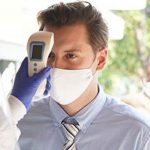Want to look more alluring? Wear a mask.
Really.
That’s the takeaway from Welsh researchers who found that masking up may make men look more attractive to the opposite sex and that some kinds of masks do a better job of this than others.
“Research carried out before the pandemic found medical face masks reduce attractiveness — so we wanted to test whether this had changed since face coverings became ubiquitous and understand whether the type of mask had any effect,” said study author Michael Lewis of Cardiff University, an expert in the psychology of faces.
And, indeed, it did.
Lewis and his colleagues showed 43 women pictures of men’s faces. They were asked to rate attractiveness of the guys without a mask, and with a cloth mask, a blue medical mask or as they held a plain black book over the area a mask would cover.
The experiment was conducted in February of last year — seven months after COVID-19 made face masks mandatory in the United Kingdom.
Men with masks were rated more attractive, and those with blue medical masks got the highest marks, according to findings published Jan. 10 in Cognitive Research: Principles and Implications.
Lewis suspects the preference for blue masks stems from seeing them on health care workers.
“Now we associate these with people in caring or medical professions,” he said in a university news release. “At a time when we feel vulnerable, we may find the wearing of medical masks reassuring and so feel more positive towards the wearer.”
The women also found faces significantly more attractive when covered by cloth masks than when left uncovered.
“Some of this effect may be a result of being able to hide undesirable features in the lower part of the face — but this effect was present for both less attractive and more attractive people,” Lewis said.
The findings run counter to a pre-pandemic study in Japan that found masks sparked thoughts of disease and a desire to avoid the wearer.
“The current research shows the pandemic has changed our psychology in how we perceive the wearers of masks,” Lewis said. “When we see someone wearing a mask we no longer think ‘that person has a disease, I need to stay away.'”
He explained that this relates to evolutionary psychology and why we select the partners we do.
“Disease and evidence of disease can play a big role in mate selection — previously any cues to disease would be a big turnoff,” Lewis said. “Now we can observe a shift in our psychology such that face masks are no longer acting as a contamination cue.”
Next up for the researchers: What about the guys? Do they think masks make women more attractive?
More information
The U.S. Centers for Disease Control and Prevention offers a guide to masks.
SOURCE: Cardiff University, news release, Jan. 13, 2022
Copyright © 2026 HealthDay. All rights reserved.
















